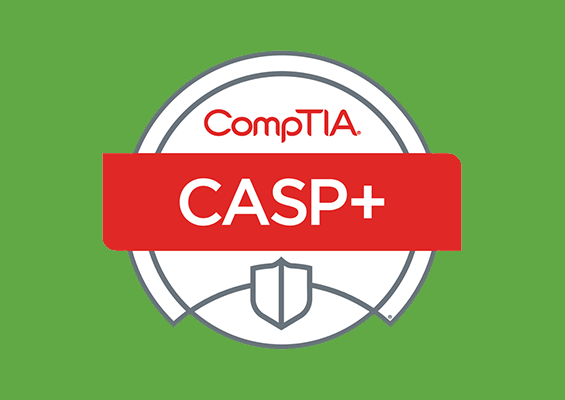 Employers need IT professionals who have advanced, hands-on skills for cybersecurity jobs including security architect, application security engineer, technical lead analyst and security engineer. These in-demand IT job roles are expected to grow over the next 10 years, according to the U.S. Bureau of Labor Statistics.
Employers need IT professionals who have advanced, hands-on skills for cybersecurity jobs including security architect, application security engineer, technical lead analyst and security engineer. These in-demand IT job roles are expected to grow over the next 10 years, according to the U.S. Bureau of Labor Statistics.
CompTIA Advanced Security Practitioner (CASP+), most recently updated in April 2018, is an advanced-level cybersecurity certification that includes both performance-based and multiple-choice questions. CASP+ assesses the hands-on skills of IT professionals who conceptualize, engineer, integrate and implement secure solutions across complex environments to support a resilient enterprise. Download the exam objectives to learn more.
CASP+ is often compared to (ISC)2 Certified Information Systems Security Professional (CISSP), and many IT pros ask themselves, “which certification is right for me?” Both exams assess advanced-level cybersecurity skills and are vendor neutral, but the similarities stop there.
4 Advantages of CASP+ Over CISSP
1. CASP+ is a performance exam.
Employers require hands-on cybersecurity skills, and CASP+ makes sure IT pros can “walk the walk” in addition to “talk the talk.” For example, two job roles shared by CASP+ and CISSP are security engineer and security architect, which require hands-on skills to build cybersecurity systems and programs. But only CASP includes simulations to test these skills on a network and various systems.
Passing the CASP+ exam and getting certified shows you have the proper skills right here, right now. Employer documentation is not required because you have proven you have the hands-on skills to perform the job.
Why take an exam that includes only multiple-choice questions when employers need to know you have the performance skills certified by CompTIA Advanced Security Practitioner?
CompTIA performance certifications validate the skills associated with a particular job or responsibility. To earn the certification, candidates must demonstrate their ability to perform related tasks through simulations and performance-based questions, proving they not only know what a job entails, but how to do it.
2. CASP+ provides cybersecurity managers with technical mastery.
In many cases, it becomes challenging to manage a cybersecurity team or program if you don’t understand how a given technology works. For example, if the board of directors asks you to ensure compliance to a specific government standard, the request may involve rolling out complex cybersecurity technologies and infrastructure requirements.
CASP+-certified professionals understand this standard and how to comply with it. They also have the advanced skills needed to lead, design and implement the technical solution.
CASP+ covers the hands-on skills needed by cybersecurity architects. According to Cyberseek, cybersecurity architects earn a median salary of $133,000 per year, and there are more than 5,000 job openings in the United States alone. CASP+ can show employers that you have the skills they are looking for.
3. CASP+ fills an industry skills gap for advanced, hands-on cybersecurity jobs.
CASP+ was born out of an industry need for a hands-on, advanced-level cybersecurity assessment. Many cybersecurity pros with more than five years of experience want to remain at the keyboard and work directly with cybersecurity technologies and tools. They may not want to be managers, or they may simply enjoy the day-to-day challenge of solving complex architecture-level security problems. CASP+ is the answer for them.
For example, for years the U.S. Navy used CISSP to certify advanced cybersecurity pros, regardless of their job role. But they had no good way of assessing advanced hands-on cybersecurity skills for personnel who were not in management positions. That is why they mandated CASP+.
Corporate cybersecurity workforces around the world are experiencing the same skills gap. That is why ManTech, Northrup Grumman, SMS Data Products Group and Booz Allen Hamilton all request CASP+ in their job ads.
CASP+ meets the ISO/ANSI 17024 standard and is approved by U.S. Department of Defense to fulfill Directive 8570.01-M requirements. It complies with government regulations under the Federal Information Security Management Act (FISMA). Regulators and government rely on ISO/ANSI accreditation because it provides confidence and trust in the outputs of an accredited program. More than 1.3 million CompTIA ISO/ANSI-accredited exams have been delivered since January 1, 2011.
4. CASP+ costs less than CISSP.
CompTIA CASP+ costs USD $439 retail and includes both performance-based simulations and multiple-choice questions. CISSP costs USD $699 retail and only includes multiple-choice questions.
Why pay USD $699 for a multiple-choice exam when you can also assess your hands-on performance at USD $439 with CompTIA Advanced Security Practitioner?
Cybersecurity Certifications to Meet Employer Demand
Advanced cybersecurity jobs are in demand, and employers need IT professionals with the skills that match their open jobs. Show employers you have the knowledge, skills and abilities they need with CASP+.
The latest version of CASP+ (CAS-003) is now available! Download the exam objectives to start preparing or purchase the Official CompTIA CASP+ Study Guide. Watch for other official CompTIA learning products coming soon!
--
Patrick Lane is a director of product management for CompTIA. He manages IT workforce skills certifications, including CompTIA Cybersecurity Analyst (CySA+), CompTIA PenTest+ and CompTIA Advanced Security Practitioner (CASP+).
Jen Blackwell also contributed to this article. She is a senior products marketing manager at CompTIA and oversees the certifications along the CompTIA Cybersecurity Career Pathway.

